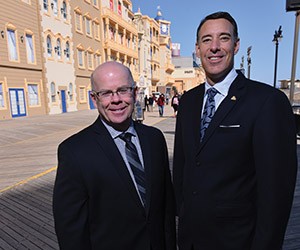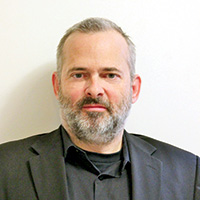Talk about the makings of an empire. Room nights up 239 percent, total expected attendees up 312 percent, and total convention square footage booked up 241 percent. Plus, a record $5.21 billion in gaming revenues, and plans for an all-encompassing product mix.
No, not Las Vegas, but Atlantic City—10 years ago. Then came the global recession, hurricanes Irene and Sandy (some say the misreporting of damage was more harmful than Sandy itself) and five total casino closings, and today, the national headlines describe a city on the brink. With citizens facing job losses, rising foreclosure rates and other woes, the tolls are serious indeed. It’s a splintered path to recovery, too, as local and state politicians tangle over the city’s future.
At the same time, other local stakeholders are telling a story of hope and optimism.
Long synonymous with boom, bust and reinvention, Atlantic City turned to casinos in the 1970s as a corporate solution to its declining convention and tourism trade. Today it seems meetings and conventions just might be coming to the rescue.
With sand in their shoes, as the local saying goes, key decision-makers at Meet AC, the Casino Reinvestment Development Authority (CRDA) and the city’s major casino-resorts are working together to strengthen Atlantic City’s meetings market. Group business is providing real reasons to believe.
Meetings Moxie
Michael Massari is not a gambler, but Caesars Entertainment’s senior vice president of national meetings and events has built his career on bold moves. Over the past decade, anticipating the rising value of the corporate customer, he first unified key meetings functions for all Caesars properties in Las Vegas, and then for Caesars’ portfolio nationwide. Today, his team supports 16,000 meetings annually, to the tune of around $400 million.
Truly intrepid, though, was Massari’s push over the past six years or so, against much initial resistance, for Caesars to invest $125.8 million in expanding its Atlantic City conference space. Over lunch in Las Vegas this April, where he spoke at Global Meetings Industry Day, Massari explained how his pitch for two new 50,000-square-foot ballrooms with prefunction space at Harrah’s Resort Atlantic City was his definitive roll of the dice.
“I staked my career on this project,” said the Philadelphia native, whose childhood memories of beaching it in Atlantic City made this both a personal and professional endeavor. “My view was, with 40 percent of the market and our long history in town, we could not sit back and watch Atlantic City decline.”
Massari’s plan followed a familiar blueprint.
“Along with Vegas and Orlando, Atlantic City runs on tourism, virtually unsupported by other industries,” he said. “As competition, casino closures and other factors continue to erode that base, the answer was to introduce that same high-value business customer through meetings and events.”
Close to Fortune 500 stronghold New York and other blue chip locales, and a tank of gas away for one-third of the U.S. population, Atlantic City is ideally situated to capture a lucrative share of the $16 billion Northeast meetings and convention market. Yet, groups were accounting for barely 2 percent of business.
“We could have spent less money on a 1,500-room beachfront hotel on 10 acres with 10 restaurants and other amenities, but to draw meetings and get people’s attention, we needed to create the largest, most functional conference venue in the region,” Massari said.
With a clear market opportunity at hand—no comparable facility existed between Baltimore and Boston—the business justification for Massari’s high-stakes wager was there. Presenting his case had its challenges, however.
“That’s putting it mildly,” Massari said with a laugh. “It took time to sell the idea.”
PageBreak
With his characteristic moxie—also an Atlantic City trait—Massari persevered against pushback that included local fears over stealing business from the Atlantic City Convention Center, and internally, with Caesars facing its own knotty finances.
He finally prevailed, and with two-thirds funding from Caesars and the rest from the CRDA, the state agency founded in 1984 to direct casino revenues to economic development projects, construction on the Harrah’s Atlantic City Waterfront Conference Center began in 2013.
Singular Intent
Through various corporate and subsidiary structures, Caesars Entertainment has been part of Atlantic City’s casino era practically since inception, with Caesars and Bally’s (1979) and Harrah’s (1980) following Resorts International’s debut in 1978. For Massari, who delighted in his childhood visits here, that legacy makes Atlantic City like home, and the surprise success of the Waterfront Conference Center, opened in September 2015, especially rewarding.
“Our initial estimates were fairly modest,” he said. “Yet, even before opening, bookings and revenues were way ahead of expectations.”
The numbers are truly off the charts. As announced at the ribbon-cutting, the Waterfront Conference Center had attracted 97,000 advance room bookings for the 12 months ahead—about triple the estimate of 30,000 to 40,000, and 14 times greater than the 7,000 advance room bookings for the preceding 12 months.
As of this April, the venue had nearly doubled its booked meetings and conventions through 2019, including 131 confirmed groups for 2016, 33 for 2017, 11 for 2018 and six for 2019—so far. Bringing in an estimated 300,000 conference attendees, these bookings have produced nearly 200,000 room nights, up from 140,000 last September.
“To achieve these results in just the first year demonstrates the vibrancy of our convention market,” said Jim Wood, president and CEO of Meet AC, the development agency for meetings and conventions. “Our singular intent is to grow our meetings business, and with Caesars taking the lead and demonstrating such commitment to the community, we expect great things in the years ahead.”
Offering 100,000 square feet of flexible space divisible into nearly 60 separate meeting rooms with up to 300 different configurations, the Waterfront Conference Center, integrated with 2,590 guest rooms and suites and another 25,000 square feet of space at Harrah’s, arrived with a bang. As Massari and other officials cut the ribbon outside, wholesale distributor Bradley Caldwell’s annual Showstoppers Trade Show, with 2,000-plus participants, was in full swing inside. The Waterfront Conference Center hosts another 2,000-plus delegate event this month—MPI’s 2016 World Education Congress (see Q&A).
Now that he has people’s attention, Massari is aiming to make meetings a cornerstone of the Atlantic City market.
“We absolutely want our competitors to build their own big convention centers,” said Massari, who is prepared “to open the books on our EBITDA and other results” when the time is right. “If we can move meetings to 20 percent of visitation or higher, then we’ll have a real meetings foothold, possibly up to the national level.”
In the meantime, those competitors are making their own bold investments in the city’s meetings future.
Resort Tactics
Having ushered in Atlantic City’s casino era with its 1978 debut as Resorts International, Resorts Casino Hotel, featuring 942 guest rooms and suites in two towers, continues to reposition for more group business.
Opened in August 2015, the new $5 million Resorts Conference Center added 12,000 square feet of versatile high-tech space, including 12 breakout rooms and the 6,500-square-foot, ocean-facing Atlantic Ballroom, complete with a multiuse prefunction area. Resorts now offers 27 meeting and function rooms with more than 64,000 square feet of usable space.
“Our new state-of-the-art conference center is showing immediate returns, driving a 30 percent increase in the booking pace compared to 2015,” said Mark Giannantonio, the property’s president and CEO. “We are confident that making smart investments into the property will further position Resorts as a premier, profitable resort destination with offerings beyond casino gambling,”
Among those returns was the 2016 New Jersey Governor’s Conference on Tourism, held in March. The show’s organizer, the New Jersey Tourism Industry Association, selected the resort specifically because of the new conference facility and other recent investments, totaling some $100 million since 2012. These include the $35 million Margaritaville casino and entertainment complex, opened in May 2013 with planner-ready attractions that include Atlantic City’s only year-round beach bar.
PageBreak
“Despite the negativity and current financial situation, which are short-term issues, Atlantic City remains a premier East Coast destination,” said Mark Sachais, vice president of hotel operations. “Resorts, the CRDA, Meet AC and other stakeholders continue to believe in the city’s long-term future.”
With work now underway on phase one of a $25 million Ocean Tower room renovation, Sachais added that ongoing capital projects across the city “will help further solidify the destination’s premier status.”
Bill Jackson, director of sales and marketing, affirmed that Atlantic City “is here to stay” as the destination works through the market adjustment.
“In the meantime,” he said, “we continue to provide outstanding products and service at an exceptional value, including some of the most sophisticated and technologically advanced meeting space in the Northeast and Mid-Atlantic.”
As Atlantic City’s first new hotel in 13 years when it opened in 2003, Borgata Hotel Casino & Spa gave the East Coast its first true Las Vegas-style destination resort, followed in 2008 by its non-gaming sister, the 800-room Water Club. Yet, the 2,000-room Borgata, the city’s market leader, has kept pace with evolving market conditions, devoting equal, if not more, reinvestment to non-gaming offerings.
“Borgata transformed Atlantic City by creating a respected brand and destination that offers more than just gaming,” said Mark Vanderwielen, vice president of hotel operations for the property. “Investing and reinvesting are key to maintaining that success, and since inception, that’s what our guests, gaming, non-gaming and convention alike, have come to expect.”
Also reflecting Borgata’s commitment to Atlantic City, aggressive capital investment—$146 million over the last five years, including 2016—yields strong returns. Last year, according to Vanderwielen, group business was up 16 percent from 2014, and 33 percent from 2013, including upticks in corporate, association and multi-year bookings.
“Negative headlines may impact the city, but not Borgata, since consumer confidence in our brand has not deterred trips or occupancy levels,” Vanderwielen said. “As our customer base, including meeting planners and delegates, experience more development, energy and traffic on-property, we are confidently operating through the city’s issues.”
In his view, recent casino closures have stabilized and “right-sized” supply.
“Borgata and the remaining properties have seen profitable growth,” Vanderwielen said. “In turn, we are seeing more investment. City operators are unified and committed to ensuring Atlantic City does well, which is in everyone’s best interest, and programs like Meet AC’s incentive fund has been effective in enticing first-time groups to visit Atlantic City, Borgata included.”
This year, Borgata is investing $50 million in projects that include the electrifying new $14 million, 18,000-square-foot Premier Nightclub, which opened this April, and 25,000 square feet of expanded conference space, adding to Borgata’s current 70,000 square feet (and 18,000 square feet next door at the Water Club).
“More” is also the operative word at Tropicana Casino and Resort, as the 2,078-room property, offering 122,000 square feet of group space, maintains its own enhancement hot streak.
“In 2015, with financing support from the CRDA, Tropicana underwent $50 million in renovations,” said Jim Ziereis, assistant vice president of hotel sales. “This year, we are investing another $40 million.”
With completed projects such as renovations to 400-plus North Tower hotel rooms, group room nights rose 10 percent last year, with midweek bookings up 16.5 percent. The 2016 outlook is bright, too, with wins that include two new corporate meetings at 700-plus room nights each.
“We are partnering with Montreal’s internationally renowned Moment Factory to take our Multimedia Light and Sound Show to a new level this year,” Ziereis said. “The show, which includes weekly fireworks, has become an attraction in itself, energizing this end of the Boardwalk.”
With 2016 projects such as renovations of 500 Havana Tower rooms and new gaming spaces, the property actively promotes its successes via social media, paid advertising, tradeshows and other vehicles to help counter the negative headlines.
“Signaling our optimism in Atlantic City’s future, these investments have been instrumental in creating jobs while increasing our revenues and visitation,” Ziereis said. “In particular, our room renovations are attracting new groups looking for a superior room product. With 25 retail shops, 24 restaurants and 18 party venues under one roof, there really is no reason to leave the property. And as we continue to build momentum, Tropicana is committed to delivering ‘more’—with no plans to stop anytime soon.”
PageBreak
Purpose-Driven
With show organizers already raving about Harrah’s Atlantic City Waterfront Conference Center (see “One Satisfied Customer” sidebar), MPI’s “reinvention” theme for this month’s World Education Congress at the venue is pitch-perfect.
“We are banking on good will and good messaging from the MPI event as we look forward to welcoming more industry shows this year,” Wood said.
These include TEAMS ’16 in September, the world’s largest conference and expo for sporting event planners, followed by the 2016 TSNN (Trade Show News Network) Awards in October, attracting America’s top 50 fastest-growing tradeshows.
“Meet AC is committed to bringing in decision-makers to see what we are doing and how we are investing,” Wood said. “We have also stepped up our advertising message by printing and distributing 500,000 meeting planner guides as a supplement to our media buy.”
With other strategic moves that have included last year’s formation of the Atlantic City Sports Commission to attract sporting events, meetings and conventions, Wood embraces the agency’s “terrific” relationship with Caesars and other operators in the collaborative effort to “elevate the whole meetings game in town.”
As the $2.4 billion Revel resort-casino prepares for a limited reopening this month, following its scorching failure in 2012, Wood supports Massari’s vision of more large-scale convention venues.
“With the new owner acquiring space surrounding the property, we will encourage them to think about adding a convention venue,” he said. “As we anticipate a record 2016 summer season, it’s a trend we see for the future.”
Targeting 300,000 booked room nights this year, Meet AC experienced a 48 percent lift in 2015, with the Harrah’s facility contributing to 253,000 room nights, up from 171,000 in 2014. Meetings alone won’t save the city, though.
“Since the creation of the Atlantic City Tourism District in 2011, we have focused investment on enhancing the destination’s non-gaming attractions,” said CRDA Executive Director John Palmieri. “Additionally, the CRDA continues to make necessary safe and clean investments in the community that city government simply cannot. … The budgetary problems related to city government are not part of the meetings industry or the tourism business.”
It’s a strategy that is working.
“CRDA invested $300.5 million in projects that brought Atlantic City a total of $800 million in new development during a time of financial insecurity in the casino marketplace,” Palmieri said. “Commitments like a new Atlantic City campus from Stockton University, and a new business center from South Jersey Gas, plus new call center operations and similar projects, will diversify our base while helping to stabilize the city’s future and attract additional businesses.”
To maintain the momentum, the CRDA created the private, not-for-profit AC Devco to attract new development and connect developers with funding sources, including the Atlantic City Improvement Authority. The CRDA also facilitates quicker commercial and residential development by strategically locating land assembled and ready for projects.
“The Atlantic City business model is slowly becoming more like the Las Vegas model, with a growing percentage of revenue coming from the non-gaming sector,” Palmieri said. “With significant ongoing CRDA and private investment in expanded meeting space, new attractions and other areas, Atlantic City will continue to evolve.”
For Massari, negative perception issues, at least in the short term, remain a key hurdle to overcome. With his $125.8 million “gamble” as persuasive proof, though, he is confident that Atlantic City is on track for a brighter future.
“Meetings and business travel are about purpose,” he said, “and purpose carries the day.”







